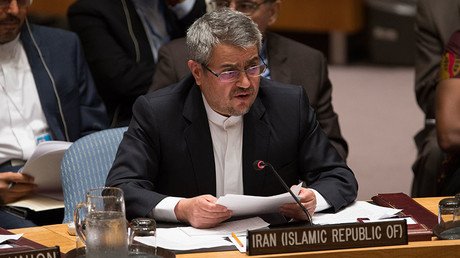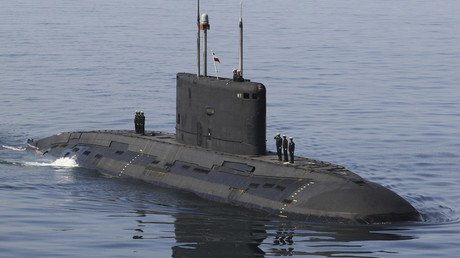Iran says US sanctions violate nuclear deal, demands meeting of world powers
Iran has called Washington’s recent decision to prolong sanctions against it a violation of the nuclear deal that it struck with world powers in 2015 and has requested a meeting of the commission that oversees the implementation of the agreement.
On Saturday, Iranian Foreign Minister Mohammad Javad Zarif asked for “a meeting of the joint commission outlined in the nuclear deal […] regarding the recent actions of the United States” in an official letter to European Union foreign policy chief Federica Mogherini, AFP reported, citing Iranian state news agency IRNA.
Mogherini coordinates the work of the commission that includes Iran and the states that, in July of 2015, reached a long-sought deal regarding Iran’s nuclear program known as the Joint Comprehensive Plan of Action (JCPOA). Among these states are France, Germany, the United Kingdom, Russia, China, and the United States. Under the deal, Iran agreed to limit its nuclear program and, in return, those powers agreed to lift the international sanctions they had imposed on it.
In the letter, Iran’s foreign minister said that, though his country remains committed to its obligations under the deal, all sides need to fulfil their commitments, as the JCPOA is a multilateral agreement.
“Maintaining the JCPOA integrity and coherence as well as its sustainability requires that all parties pay attention to (their commitments to) implement its provisions,” Zarif wrote, as cited by IANS news agency. The foreign minister expressly questioned the latest measure passed by US lawmakers to prolong sanctions against Iran and called on the commission to determine if it violates the JCPOA.
On December 1, the US Senate voted to extend the Iran Sanctions Act (ISA) for another 10 years. This act, which would re-impose sanctions on Iran that mostly limit its oil and gas trade, was first adopted in 1996 to punish investment in the Islamic Republic because of its nuclear program and support for anti-Israeli resistance groups.
On Wednesday, outgoing US President Barack Obama refused to put his signature on the bill, stating that renewing the act was pointless. However, the next day, the White House said that the bill will still come into force, as it had been passed by both chambers of the US Congress, and the president, while not signing it, will not veto it either.
Washington is convinced that the legislation does not violate the JCPOA, but Iran’s leadership, including its supreme leader, Ayatollah Ali Khamenei, and President Hassan Rouhani, does not agree.
Earlier this week, Rouhani ordered the Atomic Energy Organization of Iran (AEOI) to begin developing propulsion capability for nuclear-powered marine vessels as a response to the prolongation of the US sanctions.
Ayatollah Ali Khamenei had warned that Tehran would retaliate if the US renews sanctions last month.
“So far, the current US government has committed several violations with regard to the nuclear agreement. The most recent of them is the 10-year extension of the sanctions. If these sanctions are extended, it will surely constitute a violation of the JCPOA and [the US] should know that the Islamic Republic will definitely react to it,” Khamenei said on November 23. Iran’s nuclear energy chief, Ali Akbar Salehi, has also recently said that the extension would be a “clear violation” of the JCPOA if implemented.
READ MORE: Netanyahu has ‘about 5’ ideas for Trump to undo Iran nuclear deal
The US lawmakers’ latest move against Iran is expected to further exacerbate tensions between the Islamic Republic and Washington. Relations between the two countries have already come under increased strain recently due to US President-elect Donald Trump’s repeated promises to scrap the nuclear deal, which he has called “disaster” and “the worst deal ever negotiated.”
According to the deal, Iran agreed to reduce the number of its centrifuges by two-thirds, cap its uranium enrichment below the level needed for bomb-grade material, reduce its enriched uranium stockpile from around 10,000 kilograms to 300 for 15 years, and allow international inspectors to access its nuclear facilities. In response, Western countries agreed to lift nuclear-related international sanctions from Iran.
The head of the United Nations atomic energy watchdog, IAEA, said on Sunday that Iran has demonstrated its commitment to upholding the deal.
“We are satisfied with the implementation of the [agreement] and hope that this process will continue,” IAEA Director General Yukiya Amano was quoted as telling reporters in Tehran by the Iranian state IRNA news agency after meeting Iran’s nuclear energy chief, Ali Akbar Salehi.
“Iran has been committed to its engagement so far and this is important,” Amano added.
The deal has been hailed by President Obama as the best way to keep Iran from developing nuclear weapons, but, so far, Iran has seen limited economic benefits from it. Although it has managed to increase oil exports, the Islamic Republic has been having a hard time rejoining the international financial system, because Washington has kept a number of its non-nuclear sanctions in place, which prevents major Western banks from returning to Iran.














